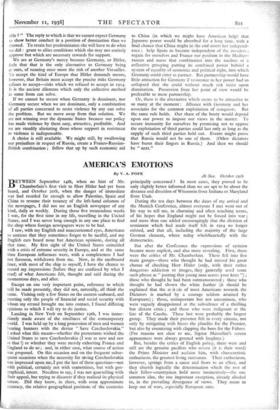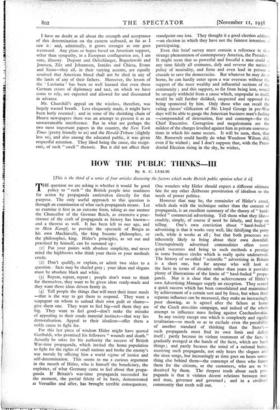AMERICA'S EMOTIONS
By V. A. POPE
At Sea. October 29th BETWEEN September r4th, when no hint of Mr. Chamberlain's first visit to Herr Hitler had yet been heard, and October zoth, when the danger of immediate war had receded far enough to. allow Palestine, Spain and China to resume their tenancy of the left-hand columns of the newspages, I did not see an English newspaper of any kind, daily or weekly. DUring those five tremendous weeks I was, for the first time in my life, travelling in the United States, and I-was never long enough in any one place to find the shop where foreign newspapers were to be had.
I saw, with my English and unaccustomed eyes, Americans so anxious that they sometimes forgot to be tactful, and my English ears heard none but American opinions, during all that time. My first sight of the United States coincided with a crisis of extreme severity in Europe, and at the same time European influences were, with a Completeness I had not foreseen, withdrawn from me. Now, in the eastbound liner, with most of the ship to myself; I have the chance to record my impressions (before they are confused by what I read) of what Americans felt, thought and said during the momentous days, and after.
Except on one very important point, reference to which will be made presently, they did not, naturally, all think the same. Visiting only a few States on the eastern seaboard, and meeting only the people of financial and social security with whom My errand brought me into contact, I found differing opinions to which I will try to do justice.
Landing in New York on September r9th, I was imme- diately made aware of the smallness of the contemporary world. I was held up by a long procession of men and women hearing banners with the device "Save Czechoslovakia." I asked what this meant—whether the protestants wished the United States to save Czechoslovakia (I was as new and raw ,is that !) or whether they were merely exhorting France and "England to do so'; and, in either case, what course of action vas proposed. On this occasion and on the frequent subse- 4uent occasions when the necessity for saving Czechoslovakia was impressed upon me,I put the last of these questions—not with political, certainly not with contentious, but with geo- graphical, intent. Needless to say, I was not quarrelling with heir appeal, but trying to discover if they realised its physical -iature. Did they know, in short, with even approximate dccuracy, the relative geographical positions of the countries principally concerned ? In most cases, they proved to be only slightly better informed than we are apt to be about the distance and direction of Wisconsin from Indiana or Maryland from Utah.
During the ten days between the dates of my arrival and the Munich Conference, almost everyone I met went out of his way to tell me, in charming and often touching terms, of his hopes that England might not be forced into war ; and more than one added encouragingly that the division of sentiment which had made itself felt in 1914 no longer existed, and that all, including the majority of the large German ' element, where today wholeheartedly with the democracies.
But after the Conference the expressions of opinion became more explicit, and also more revealing. First, there were the critics of Mr. Chamberlain. These fell into five main groups—those who thought he had missed his great chance of checking Herr Hitler (only, with their rather dangerous addiction to images, they generally used some such phrase as " putting that young man across your knee ") ; those who thought he had been outmanoeuvred ; those who thought he had shown the white feather (it should be explained that the ati it ide of most Americans towards the Dictators is marked by a courage seldom attained by Europeans) ; those, unimportant but not uncommon, who were vaguely disappointed at the subsidence of a thrilling but distant crisis ; and those who were indignant at the Pate of the Czechs. These last were probably the largest group. They made their presence felt in every cinema, not only by mitigating with hisses the plaudits for the Premier, but also by countering with dapping the boos for the Fiihrer. (For reasons not clear to me, Signor Mussolini's screen appearances were always greeted with laughter.) But, besides the critics of English policy, there were and still are the genuine pacifists who revere (it is their word) the Prime Minister and acclaim him, with characteristic enthusiasm, the greatest living statesman. Their enthusiasm, however, springs from a cause and flows to an effect, and they cherish logically the determination which the rest of their fellow-countrymen hold more instinctively—the one common idea, the one important exception, already alluded to, in the prevailing divergence of views. They mean to keep out of wars, especially European ones. I have no doubt at all about the strength and acceptance of this determination on the eastern seaboard, as far as I saw it : and, admittedly, it grows stronger as one goes westward. Any plans or hopes based on American support, other than sympathy, in a European conflagration are, I am sure, illusory. Dupont and Oelschlaeger, Boguslawski and Jonescu, Zilz and Johannsen, Ionides and Chiesa, Evans and Sizoo—they all, in their varying accents, are equally resolved that American blood shall not be shed in any of the lands of any of their fathers. Moreover, the lesson of the Lusitania ' has been so well learned that even those German errors of diplomacy and tact, on which we have come to rely, are expected and allowed for and discounted in advance.
Mr. Churchill's appeal on the wireless, therefore, was largely wasted breath. Less eloquently made, it might have been hotly resented ; and in some of the shrinking chain of Hearst newspapers there was an attempt to present it as an unwarrantable interference. But in what are perhaps the two most important papers in the country, the New York Times (pretty friendly to us) and the Herald-Tribune (slightly less so), and also among the educated public, it was given respectful attention. They liked being the cause, the recipi- ents, of such " swell " rhetoric. But it did not affect their standpoint one iota. They thought it a good election address —an election in which they have not the faintest intention of participating. Even this brief survey must contain a reference to that strange phenomenon of contemporary America, the President. It might seem that so powerful and forceful a man could at any time falsify all estimates, defy and reverse the national policy of neutrality, and form and even lead in person a crusade to save the democticies. But whatever he may do at home, he can hardly enter upon a war overseas without the support of the most wealthy and influential sections of the community ; and this support, so far from being lent, would be savagely withheld from a cause which, unpopular in itself, would be still further disliked, suspected and opposed for being sponsored by him. Only those who can recall the ruling classes' vilification of Mr. Lloyd George in pre-War days will be able to gauge the American business man's feeling —compounded of detestation, fear and contempt—for the Chief Executive. Corruption and megalomania are the mildest of the charges levelled against him in private conversa- tions in which his name occurs. It will be seen, then, that Mr. Roosevelt could hardly do what Woodrow Wilson did, even if he wished ; and I don't suppose that, with the Presi- dential Election rising in the sky, he wishes.











































 Previous page
Previous page